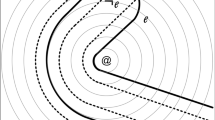Abstract
The principle that causes always render their effects more likely is fundamental to the enterprise of reducing facts of causation to facts about (objective) chances. This reductionist enterprise faces famous difficulties in accommodating common-sense intuitions about causal processes, if it insists on cashing out causal processes in terms of streams of events in which every event that belongs to the stream is a cause of the adjoining event downstream of it. I shall propose modifications to this way of cashing out causal processes, still well within the reductionist faith. These modifications will allow the reductionist to handle processes successfully, on the assumption that the reductionist proposal is itself otherwise satisfactory. I shall then argue that the reductionist enterprise lies squarely behind the Theory of Relativity, and so has all the confirmatory weight of Relativity behind it. However this is not all good news for reductionists. For throughout I shall simply assume that the reductionist proposal, to the effect that causes are just chance-raisers, is correct. AndI shall sidestep problems with that proposal as such. And so I shall show that, if in the end we find the reductionist proposal unsatisfactory, it cannot be on grounds of its treatment of causal processes as such. Thus, while I shall argue that causal processes pose no extra trouble for redutionists, I shall be making a case that all the action between reductionists and their opponents should be focused upon the proposal to reduce the two-term causal relation itself to relations amongst probabilities.
Similar content being viewed by others
REFERENCES
Aronson, J.: 1971, ‘On the Grammar of “Cause”', Synthese 22, 413–430.
Butterfield, J.: 1989, ‘A Space-time Approach to the Bell Inequality', in Philosophical Consequences of Quantum Theory, Notre Dame University Press, pp. 114–144.
Cartwright, N.: 1989, Nature's Capacities and their Measurement, Clarendon Press, Oxford.
Dowe, P.: 1992, ‘Wesley Salmon's Process Theory of Causality and the Conserved Quantity Theory', Philosophy of Science 59, 195–216.
Dowe, P.: 1993 ‘On the Reduction of Process Causality to Statistical Relevance', British Journal for the Philosophy of Science 44, 325–327.
Dowe, P.: 1995, ‘What's Right and What's Wrong with Transference Theories', Erkenntnis 42, 363–374.
Eells, E. and E. Sober: 1983, ‘Probabilistic Causality and the Question of Transitivity', Philosophy of Science 50, 35–57.
Fair, D.: 1967, ‘Causation and the Flow of Energy', Erkenntnis 14, 219–250.
Geiger, D. and J. Pearl: 1988, ‘Logical and Algorthmic Properties of Conditional Independence', Technical report, Cognitive Systems Laboratory, UCLA.
Geroch, R.: 1978, Relativity from A to B, University of Chicago Press, Chicago.
Good, I. J.: 1961, A Causal Calculus, i–ii.
Irzik, G.: 1996, ‘Can Causes be Reduced to Correlations', British Journal for the Philosophy of Science 47, 249–270.
Kitcher, P.: 1989, ‘Explanatory Unification and the Causal Structure of the World', in P. Kitcher and W. Salmon (eds), Minnesota Studies in the Philosophy of Science, University of Minnesota Press, Minneapolis.
Mellor, D. H.: 1988, ‘On Raising the Chances of Effects', in J. H. Fetzer (ed.), Probability and Causality, Kluwer, Dordrecht, pp. 229–39.
Glymour, C., Spirtes, P. and Scheines, R.: 1992, Causation, Prediction and Search, Springer-Verlag.
Papineau, D.: 1989, ‘Pure, Mixed and Spurious Probabilities and Their Significance for a Reductionist Theory of Causation', in P. Kitcher and W. Salmon (eds), Minnesota Studies in the Philosophy of Science, University of Minnesota Press, Minneapolis, pp. 347–388.
Papineau, D.: 1993, ‘Can We Reduce Causal Direction to Probabilities?', Proceedings of the 1992 Bienniel Meeting of the Philosophy of Science Association 2, 238–252.
Pearl, J.: 1988, Probabilistic Reasoning in Intelligent Systems, Morgan Kaufman, San Mateo.
Pearl, J. and Paz, A.: 1985, ‘Graphoids: A Graph-based Logic for Reasoning About Relevance Relations', in D. Hogg B. DuBoulay and L. Steels (eds), Advances in Artificial Intelligence 2, North-Holland, Amsterdam.
Reichenbach, H.: 1956, The Direction of Time, University of California Press, Los Angeles.
Reichenbach, H.: 1958, The Philosophy of Space and Time, Dover, New York.
Russell, B.: 1948 Human Knowledge, Simon and Schuster, New York.
Salmon, W. C.: 1984, Scientific Explanation and the Causal Structure of the World, Princeton University Press, Princeton.
Sober, E.: 1988, ‘The Principle of the Common Cause', in J. H. Fetzer (ed.), Probability and Causality, Kluwer, Dordrecht.
Suppes, P.: 1970 A Probabilistic Theory of Causality, North-Holland, Amsterdam.
Author information
Authors and Affiliations
Rights and permissions
About this article
Cite this article
Thalos, M. The Reduction of Causal Processes. Synthese 131, 99–128 (2002). https://doi.org/10.1023/A:1015015024056
Issue Date:
DOI: https://doi.org/10.1023/A:1015015024056




